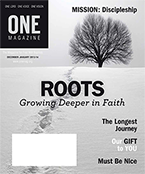
December-January 2014
Roots: Growing
Deeper in Faith
------------------
|

My Name Is Barren
by Elizabeth Hodges
“He Knows My Name,” the WNAC theme for the year, focuses on the lives of 12 women and the implications of their lives for women today. With these thoughts simmering in my brain, I began to ponder women known as barren: Sarah, Rebekah, Rachel, Hannah, the Shunamite woman, and Elisabeth, just to name a few.
Consider the culture in biblical times. The Jewish people looked upon children as a “heritage from the Lord” (Psalm 127:3), sources of strength and blessing (Psalm 128:4-5).
In contrast, childlessness was viewed as a grave misfortune or severe punishment. It simply was not socially acceptable. Barrenness led to the assumption that God was displeased with these women.
Thus, in the lives of the women listed above, their miraculous conceptions were obvious acts of God—merciful attention from the Almighty. These women sought the Lord to ask for a child. As Hannah told Eli, I “have poured out my soul before the Lord…For this child I prayed; and the Lord hath given me my petition which I asked of Him” (1 Samuel 1:15, 27). God heard the prayers, opened wombs, and gave life.
For obvious reasons, my attention kept returning to my namesake Elisabeth. Luke 1:5-8 describes her predicament: “There was in the days of Herod, the king of Judaea, a certain priest named Zacharias, of the course of Abia: and his wife was one the daughters of Aaron, and her name was Elisabeth. And they were both righteous before God, walking in all the commandments and ordinances of the Lord blameless. And they had no child, because that Elisabeth was barren, and they both were now well stricken in years.”
Elisabeth’s situation was complicated because her husband was priest. Yet, Scripture specifically mentions that both Zacharias and Elisabeth were “righteous before God…and blameless…walking in all the commandments and ordinances of the Lord.” The couple had reason to be less than blameless from a cultural point of view. From Luke’s gospel, we know they were “well stricken in years,” that is, just plain old. What a testimony of trusting God even when you don’t understand.
Perhaps you remember how the rest of Luke 1 unfolds. When Zacharias’ turn came to fulfill the duties of priest, the lot fell on him to burn incense in the temple of God. As he performed his duties, “the whole multitude of the people were praying without at the time of the incense” (verse 10). The angel of the Lord appeared to Zacharias and told him his prayer has been answered, that Elisabeth would bear a son (verses 13-14).

Zacharias’ response was very normal, “How can I to be sure this will happen? You know I am an old man, and my wife is an old woman.” Gabriel told him he would not speak again until the baby boy was born. Zacharias left the inner Temple, returned to the people, and “beckoned unto them, and remained speechless” (Luke 1:22). The crowd obviously assumed he had seen a vision since he had been inside so long. After his priestly work was completed, he returned home.
Just imagine the written communication between Zacharias and Elisabeth as he shared the details of what happened to him in the temple. Scripture does not record her reaction, but I can picture her laughing, much like Sarah in the Old Testament.
As Luke reveals, it happened just as the angel promised. “After those days his wife, Elisabeth conceived, and hid herself five months, saying, Thus hath the Lord dealt with me in the days wherein he looked on me to take away my reproach among men” (Luke 1:24-25). Elisabeth testified that God had been at work. No longer would she be scorned. She was about to become a mother. No longer barren but blessed.
Can you even imagine the praise sessions she and Zacharias shared during those five months when she hid her pregnancy? He couldn’t utter a sound, but he could write. She voiced praise to God for both of them in a time that surely felt surreal.
Little did Elisabeth know what God had in store. During the next month, Gabriel visited her cousin Mary and delivered the long-anticipated news that the Messiah would be born. Mary was young, unmarried but engaged, and in a terrible predicament. Mary had one simple question, “How shall this be, seeing I know not a man?” (Luke 1:34). Assuring Mary that her pregnancy was the work of God, Gabriel told her, “Behold, thy cousin Elisabeth, she hath also conceived a son in her old age: and this is the sixth month with her, who was called barren. For with God nothing shall be impossible” (Luke 1:36-37).
After receiving the shocking news of her impending birth, Mary traveled to spend some time with Elisabeth. (Can you blame her?) Perhaps you remember what Elisabeth said in her greeting to Mary? “Whence is this to me, that the mother of my Lord should come to me” (Luke 1:44)? There had been no email, snail mail, texts, or phone calls. God revealed this news to Elisabeth before Mary’s arrival. I can only imagine the depth of the conversations between these two expectant mothers, one “well stricken in years” and one unmarried, yet both obedient to the Lord’s touch on their lives.
Both women delivered their babies, men who would impact their world. One prepared the way for the long-awaited Messiah, and the other changed the course of eternity. Elisabeth gave birth to John the Baptist, and her husband’s voice returned after he wrote down the name of their son. What fountains of praise flowed from his mouth after nine months of silence. What an impact this had on the community and those who had watched these events unfold. Many years later Jesus reflected on his cousin, “Among those that are born of women there is not a greater prophet than John the Baptist: but he that is least in the kingdom of God is greater than he” (Luke 7:28).
During the many years she suffered as a barren woman, I cannot believe Elisabeth ever imagined the blessings awaiting her in old age. She knew she would give birth to a man-child long before the days of ultrasound technology. She was among the first to learn the Messiah would be born. She encouraged Mary during a difficult time in her life.
What a privilege! Not only was she given the blessing of a son, but he was also destined to be the greatest prophet born to a woman. He prepared the way for the “Lamb of God, which taketh away the sin of the world” (John 1:29). Barren? Oh, yes…for many years. But blessed beyond measure.
What about us? Are we faithful, righteous, and blameless during our barren times, so God can indeed bless us to be a blessing to others?
About the Writer: Elizabeth Hodges is executive director of Women Nationally Active for Christ. Learn more at www.wnac.org.
|
|

